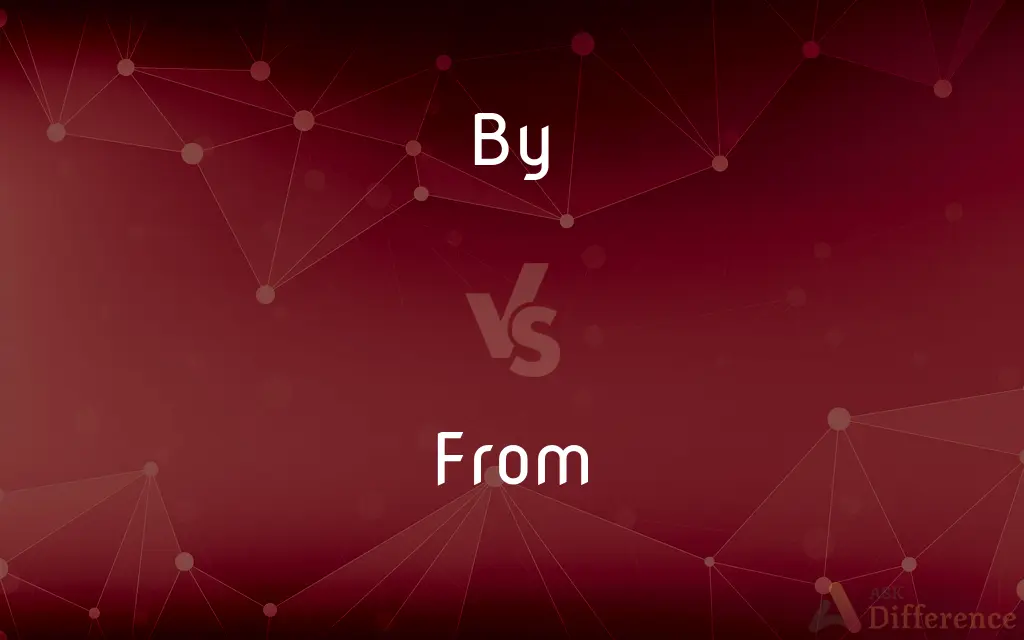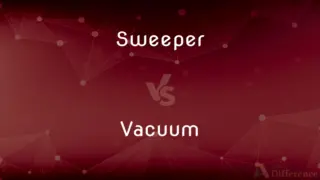By vs. From — What's the Difference?
By Tayyaba Rehman & Fiza Rafique — Updated on March 11, 2024
"By" often indicates agency, method, or means, whereas "from" typically denotes origin, source, or separation.

Difference Between By and From
Table of Contents
ADVERTISEMENT
Key Differences
"By" is used to express the agent performing an action in passive constructions, such as in "The book was written by the author." It can also denote the means or method through which something is done, as in "She traveled by plane. Conversely, "from" is primarily used to indicate the starting point of a particular action or motion, the source of something, or the material out of which something is made, exemplified in sentences like "She walked from the store to her home," "This cheese is made from milk," or "The message is from my brother."
"By" can indicate proximity, deadlines, or a part of the day, like "by the window," "by tomorrow," or "by night." "From" can also denote a change in state or condition, as in "from happy to sad," and is used to distinguish between two different things, like "different from."
The distinction between "by" and "from" is essential in understanding their correct usage in various contexts, as "by" often relates to processes, agents, or methods, and "from" to origins, sources, or transitions. While there can be some overlap in their usage, particularly in expressions of change or transformation, their primary functions remain distinct.
Comparison Chart
Primary Use
Indicates agency, method, or means.
Denotes origin, source, or separation.
Example
"The song was composed by Mozart."
"I received a gift from my friend."
ADVERTISEMENT
Function
Used in passive voice; denotes proximity, method, or deadline.
Indicates starting point, source, material, or contrast.
Connotation
Involvement, means, or proximity.
Origin, separation, or contrast.
Additional Uses
Can indicate authorship, means of transportation, or a specific time frame.
Can show transformation, material composition, or distinction.
Compare with Definitions
By
Agent or cause in passive voice.
The cake was eaten by the child.
From
Starting point or origin.
The flight from New York to London.
By
Proximity or location.
The cafe by the river is lovely.
From
Source or provenance.
This wine comes from Italy.
By
Authorship or creation.
A novel by Hemingway.
From
Material or composition.
A sculpture made from marble.
By
Means or method.
They traveled by train.
From
Separation or distinction.
He walked away from the group.
By
Deadline or specific time.
Please finish the report by Monday.
From
Change in state or condition.
The weather changed from sunny to rainy.
By
Identifying the agent performing an action.
From
Used to indicate a specified place or time as a starting point
Walked home from the station.
From six o'clock on. See Usage Notes at escape, whence.
By
Indicating the means of achieving something
They substantiate their opinions by the use of precise textual reference
They plan to provide further working capital by means of borrowing
Malaria can be controlled by attacking the parasite
From
Used to indicate a specified point as the first of two limits
From grades four to six.
By
Indicating the amount or size of a margin
The raising of VAT by 2.5%
The shot missed her by miles
From
Used to indicate a source, cause, agent, or instrument
A note from the teacher.
Taking a book from the shelf.
By
Indicating a deadline or the end of a particular time period
By now Kelly needed extensive physiotherapy
I've got to do this report by Monday
From
Used to indicate constituent material or materials
A table made from wood.
By
Indicating location of a physical object beside a place or object
Remains were discovered by the roadside
The pram was by the dresser
From
Used to indicate separation, removal, or exclusion
Keep someone from making a mistake.
Liberation from bondage.
By
Indicating the period in which something happens
This animal always hunts by night
From
Used to indicate differentiation
Know right from wrong.
By
Concerning; according to
She had done her duty by him
Anything you do is all right by me
From
Because of
Faint from hunger.
By
Used in mild oaths
It was the least he could do, by God
I swear by Almighty God
From
Used to indicate source or provenance.
Paul is from New Zealand.
I got a letter from my brother.
You can't get all your news from the Internet.
By
So as to go past
A car flashed by on the other side of the road
He let only a moment go by
From
Originating at (a year, time, etc.)
This manuscript is from the 1980s.
By
Variant spelling of bye
From
Used to indicate a starting point or initial reference.
He had books piled from floor to ceiling.
He departed yesterday from Chicago.
This figure has been changed from a one to a seven.
Face away from the wall!
By
Close to; next to
The window by the door.
From
Indicating a starting point in time.
The working day runs from 9 am to 5 pm.
Tickets are available from 17th July.
By
With the use or help of; through
We came by the back road.
From
Indicating a starting point on a range or scale.
Rate your pain from 1 to 10.
Start counting from 1.
By
Up to and beyond; past
We drove by the house.
From
Indicating a starting point on an array or gamut of conceptual variations.
You can study anything from math to literature.
By
At or to
Stopped by the bakery.
Came by the house.
From
With reference to the location or position of a speaker or other observer or vantage point.
It's hard to tell from here.
Try to see it from his point of view.
The bomb went off just 100 yards from where they were standing.
From the top of the lighthouse you can just see the mainland.
By
In the period of; during
Sleeping by day.
From
(MLE) Indicates a starting state of the predicament of the subject. since being
I’ve been doing this from pickney.
By
Not later than
By 5:30 PM.
From
Indicating removal or separation.
After twenty minutes, remove the cake from the oven.
The general was ousted from power.
By
In the amount of
Letters by the thousands.
From
Denoting a subtraction operation.
20 from 31 leaves 11.
By
To the extent of
Shorter by two inches.
From
Indicating exclusion.
She was barred from entering.
A parasol protects from the sun.
By
According to
Played by the rules.
From
Indicating differentiation.
Your opinions differ from mine.
He knows right from wrong.
By
In the name of
Swore by the Bible to tell the truth.
From
Produced with or out of (a substance or material).
It's made from pure gold.
By
Used to indicate a succession of specified individuals, groups, or quantities
One by one they left. They were persuaded little by little.
From
Used to indicate causation; because of, as a result of.
Too many people die from breast cancer.
By
Used in multiplication and division
Multiply 4 by 6 to get 24.
From
Out of the neighborhood of; lessening or losing proximity to; leaving behind; by reason of; out of; by aid of; - used whenever departure, setting out, commencement of action, being, state, occurrence, etc., or procedure, emanation, absence, separation, etc., are to be expressed. It is construed with, and indicates, the point of space or time at which the action, state, etc., are regarded as setting out or beginning; also, less frequently, the source, the cause, the occasion, out of which anything proceeds; - the antithesis and correlative of to; as, it, is one hundred miles from Boston to Springfield; he took his sword from his side; light proceeds from the sun; separate the coarse wool from the fine; men have all sprung from Adam, and often go from good to bad, and from bad to worse; the merit of an action depends on the principle from which it proceeds; men judge of facts from personal knowledge, or from testimony.
Experience from the time past to the time present.
The song began from Jove.
From high Mæonia's rocky shores I came.
If the wind blow any way from shore.
Sudden partings such as pressThe life from out young hearts.
By
Used with measurements
A room 12 by 18 feet.
By
Toward. Used to express direction with points of the compass
South by east.
By
On hand; nearby
Stand by.
By
Aside; away
We put it by for later.
By
Up to, alongside, and past
The car raced by.
By
At or to one's home or current location
Stop by later today.
By
Into the past
As years go by.
By
Variant of bye1.
By
Near or next to.
The mailbox is by the bus stop.
By
From one side of something to the other, passing close by; past.
The stream runs by our back door.
He ran straight by me.
By
Not later than (the given time); not later than the end of (the given time interval).
Be back by ten o'clock!.
We'll find someone by the end of March.
We will send it by the first week of July.
By
Indicates the person or thing that does or causes something: Through the action or presence of.
By
Following a passive verb.
The matter was decided by the chairman.
The boat was swamped by the water.
He was protected by his body armour.
By
Following a noun.
There was a call by the unions for a 30% pay rise.
By
(not in common modern use) Following an adjective.
I was aghast by what I saw.
By
Indicates the creator of a work: Existing through the authorship etc. of.
There are many well-known plays by William Shakespeare
By
Indicates a means of achieving something: Involving/using the means of.
I avoided the guards by moving only when they weren't looking.
By Pythagoras' theorem, we can calculate the length of the hippopotamus.
We went by bus.
I discovered it by chance.
By 'maybe' she means 'no'.
The electricity was cut off, so we had to read by candlelight.
By
Indicates an authority according to which something is done.
By the power vested in me, I now pronounce you man and wife.
By
Invokes an authority in an oath.
By Jove! I think she's got it!
By all that is holy, I'll put an end to this.
By
Indicates the amount of change, difference or discrepancy
Our stock is up by ten percent.
His date of birth was wrong by ten years.
By
In the formulae X by X and by Xs, indicates a steady progression, one X after another.
We went through the book page by page.
We crawled forward by inches.
By
Acted on in units of the specified size or measure. (Sometimes hyperbolically)
Sold by the yard; cheaper if bought by the gross
He drinks brandy by the bucketful!
By
Per; with or in proportion to each.
His health was deteriorating by the day.
The pickers are paid by the bushel.
By
Indicates a referenced source: According to.
He cheated by his own admission.
By my reckoning, we should be nearly there.
By
Used to separate dimensions when describing the size of something.
It is easy to invert a 2-by-2 matrix.
The room was about 4 foot by 6 foot.
The bricks used to build the wall measured 10 by 20 by 30 cm.
By
(horse breeding) Designates a horse's male parent (sire); cf. out of.
She's a lovely little filly, by Big Lad, out of Damsel in Distress.
By
At, with, among
Are you eating by Rabbi Fischer? (at the house of)
By Chabad, it's different. (with, among)
By
Along a path which runs past the speaker.
I watched as it passed by.
By
In the vicinity, near.
There was a shepherd close by.
By
To or at a place, as a residence or place of business.
I'll stop by on my way home from work.
We're right near the lifeguard station. Come by before you leave.
By
Aside, away.
The women spent much time after harvest putting jams by for winter and spring.
By
Out of the way, off to one side.
A by path, a by room
By
Subsidiary, incidental.
By catch, a by issue
By
Alternative spelling of bye.
By
In the neighborhood of; near or next to; not far from; close to; along with; as, come and sit by me.
By foundation or by shady rivuletHe sought them both.
By
On; along; in traversing. Compare 5.
Long labors both by sea and land he bore.
By land, by water, they renew the charge.
By
Near to, while passing; hence, from one to the other side of; past; as, to go by a church.
By
Used in specifying adjacent dimensions; as, a cabin twenty feet by forty.
By
Against.
By
With, as means, way, process, etc.; through means of; with aid of; through; through the act or agency of; as, a city is destroyed by fire; profit is made by commerce; to take by force.
By
Near; in the neighborhood; present; as, there was no person by at the time.
By
Passing near; going past; past; beyond; as, the procession has gone by; a bird flew by.
By
Aside; as, to lay by; to put by.
By
Out of the common path; aside; - used in composition, giving the meaning of something aside, secondary, or incidental, or collateral matter, a thing private or avoiding notice; as, by-line, by-place, by-play, by-street. It was formerly more freely used in composition than it is now; as, by-business, by-concernment, by-design, by-interest, etc.
By
So as to pass a given point;
Every hour a train goes past
By
In reserve; not for immediate use;
Started setting aside money to buy a car
Put something by for her old age
Has a nestegg tucked away for a rainy day
Common Curiosities
Can "by" and "from" be used interchangeably?
Generally, no. Their usage depends on the context: "by" for agency or means, and "from" for origin or source. However, in some contexts, like expressions of change, they might have similar functions but with different nuances.
Is "by" only used in passive sentences?
No, "by" is also used to indicate means, proximity, deadlines, and in expressions like "by the way."
Can "by" indicate a specific time?
Yes, "by" can indicate a deadline or a point in time by which something should be completed, as in "by 5 o'clock."
How does "from" indicate contrast?
"From" can indicate contrast by showing a distinction between two different states, places, or things, often used with "to" or "than," as in "different from" or "from bad to worse."
What's an example of "by" indicating authorship?
An example would be "a painting by Van Gogh," where "by" shows who created the work.
How do you choose between "by" and "from" in a sentence?
Choose "by" to indicate the agent in passive constructions or the method/means of an action, and "from" to denote the starting point, source, or material.
Does "by" have a spatial meaning?
Yes, "by" can indicate proximity or location, as in "standing by the door."
How does "from" express change?
"From" expresses change by denoting the initial state in a transition, as in "from young to old."
How do you express the source with "from"?
Use "from" to indicate the source of something, whether it's a location, person, or material, as in "a gift from a friend" or "made from wood."
Is "by" used in expressions of manner?
"By" can be used in expressions that relate to manner, especially when referring to the means by which something is done, as in "by accident" or "by hand."
Can "from" be used to show a range?
Yes, "from" can be used to show a range in expressions like "from January to March," indicating the start and end points of the range.
Share Your Discovery

Previous Comparison
Sweeper vs. Vacuum
Next Comparison
Matrix vs. DeterminantAuthor Spotlight
Written by
Tayyaba RehmanTayyaba Rehman is a distinguished writer, currently serving as a primary contributor to askdifference.com. As a researcher in semantics and etymology, Tayyaba's passion for the complexity of languages and their distinctions has found a perfect home on the platform. Tayyaba delves into the intricacies of language, distinguishing between commonly confused words and phrases, thereby providing clarity for readers worldwide.
Co-written by
Fiza RafiqueFiza Rafique is a skilled content writer at AskDifference.com, where she meticulously refines and enhances written pieces. Drawing from her vast editorial expertise, Fiza ensures clarity, accuracy, and precision in every article. Passionate about language, she continually seeks to elevate the quality of content for readers worldwide.














































